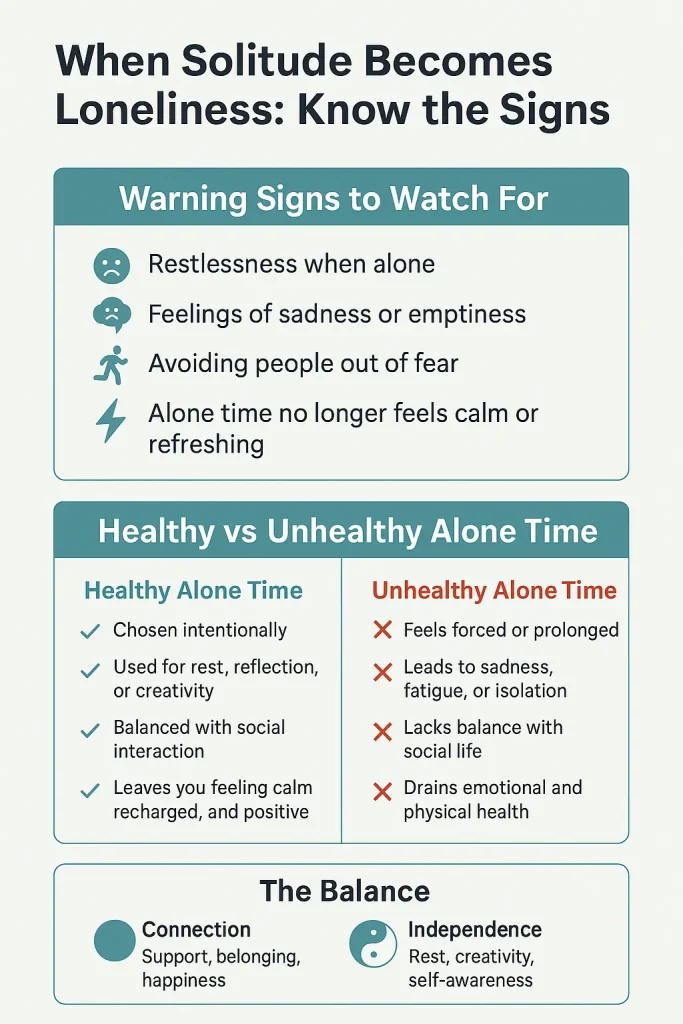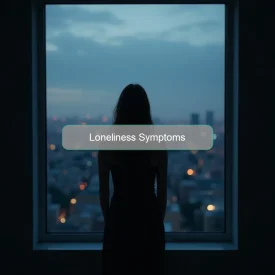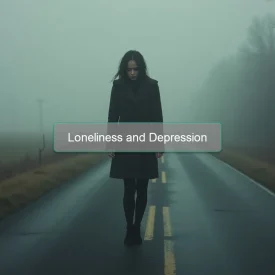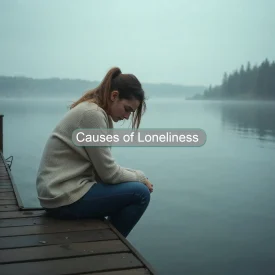Loneliness and solitude are words that often get used interchangeably because both involve being alone. However, they describe two very different experiences. Loneliness is the painful feeling of being disconnected from others, while solitude is the calm, intentional choice to spend time alone.
Recognizing the difference between solitude and loneliness is important for understanding how being alone affects our mental and emotional well-being.
Many people mix them up because they both involve being physically apart from other people. Yet loneliness often feels heavy, empty, and isolating. Solitude, on the other hand, can feel refreshing, creative, and empowering.
Key Takeaways
- Loneliness is unwanted disconnection; solitude is a chosen, restorative pause.
- Long-term loneliness strains mental and physical health, while intentional solitude can lower stress and boost creativity and focus.
- Loneliness heightens threat and stress responses; solitude supports reflection, problem-solving, and calm.
- Balance matters. Mix meaningful social connection with regular, intentional alone time to keep well-being strong.
- Journal, practice mindfulness, and pursue creative hobbies; if loneliness persists, build deeper relationships and consider therapy or community groups.
Knowing the difference between solitude vs loneliness is important because it influences how we care for our mental health and whether our alone time helps or harms us.
For me, the difference between solitude and loneliness became clear when I moved to a new city. At first, being alone felt heavy and isolating—like I was missing a sense of belonging. But once I began choosing quiet evenings for journaling and walks, that same alone time started to feel refreshing instead of draining. The shift was in the choice: loneliness was imposed, while solitude was intentional.
Key Differences Between Loneliness and Solitude
To understand solitude vs loneliness, it helps to see how each one affects your feelings and mind. If you’re a visual learner, this chart highlights the main contrasts at a glance:
Loneliness vs Solitude Chart
| Aspect | Loneliness | Solitude |
| Definition | The painful feeling of being disconnected, even when not physically alone. | A chosen and intentional time spent alone to recharge. |
| Emotional State | Sadness, emptiness, restlessness, feeling left out. | Calm, clarity, peace, empowerment. |
| Impact on Health | Raises stress and cortisol, linked to depression, anxiety, and physical health risks. | Reduces stress, improves focus, supports creativity and emotional balance. |
| Choice Factor | Usually unwanted or forced. | Voluntary and embraced. |
| Social Connection | Lacks meaningful bonds despite presence of people or online interactions. | Enhances ability to connect better after recharging. |
| Long-term Effect | Can weaken mental and physical well-being. | Builds resilience, self-awareness, and personal growth. |
Quick Comparison: Loneliness vs Solitude (Mobile-Friendly)
- Definition
- Loneliness: Unwanted disconnection, even around others.
- Solitude: Chosen alone time to recharge.
- Loneliness: Unwanted disconnection, even around others.
- Emotional State
- Loneliness: Sadness, emptiness, restlessness.
- Solitude: Calm, clarity, peace.
- Loneliness: Sadness, emptiness, restlessness.
- Impact on Health
- Loneliness: Raises stress, increases risk of depression/anxiety.
- Solitude: Reduces stress, boosts creativity and focus.
- Loneliness: Raises stress, increases risk of depression/anxiety.
- Choice Factor
- Loneliness: Forced or unwanted.
- Solitude: Voluntary and embraced.
- Loneliness: Forced or unwanted.
- Social Connection
- Loneliness: Lacks meaningful bonds.
- Solitude: Improves quality of connections after recharging.
- Loneliness: Lacks meaningful bonds.
- Long-Term Effect
- Loneliness: Can weaken mental and physical well-being.
- Solitude: Builds resilience, self-awareness, and growth.
- Loneliness: Can weaken mental and physical well-being.
Loneliness often brings feelings of sadness, emptiness, and being left out. It can feel overwhelming and inescapable—you may not want to be alone, yet still feel isolated. Solitude, on the other hand, brings calm, focus, and makes you feel strong because it is a choice you make to rest or think.
These two experiences affect your health differently. Long-term loneliness can increase stress, cause depression, and even hurt your physical health. Solitude, when chosen, can make you stronger, more creative, and less anxious.
What Is Loneliness?
Let’s learn more about what loneliness really means and why it affects people so deeply.

Definition of Loneliness
Loneliness is the feeling of being disconnected from people, even if you are not physically alone. It can make you feel sad and empty.
For a more in-depth look at the meaning of loneliness and how it affects people, you may check our detailed guide on loneliness meaning.
Emotional and Psychological Effects
You might feel more stressed or anxious, your confidence might drop, and you could become at risk of depression. Common loneliness symptoms include sadness, lower self-esteem, and increased anxiety, which can impact everyday life.
Common Causes of Loneliness
Common reasons people feel lonely include moving to a new place, going through a breakup or divorce, or losing someone important.
Sometimes, people have many acquaintances but no close friends, which also causes loneliness. Today, being active on social media doesn’t always help because online connections often do not provide real emotional support.
For those experiencing loneliness, exploring options like What is an AI girlfriend can offer helpful insights into new ways people find companionship in today’s digital world. AI companions, such as an AI girlfriend, provide meaningful interaction and support that many find comforting.
What Is Solitude?
Now let’s take a closer look at solitude and why choosing to be alone can actually be a positive experience.

Definition of Solitude
Solitude is when you choose to be alone and enjoy it. It’s a positive experience where you can find peace and recharge.
Benefits of Solitude
Spending time in solitude helps you think about your feelings and learn more about yourself. It gives you space to be creative and work without distractions.
Solitude also helps lower stress and lets your mind rest from the busy world. Everyone, whether shy or outgoing, needs some time alone to relax and grow.
How Our Brain Reacts to Loneliness vs Solitude

Our brain reacts in very different ways depending on whether we are feeling lonely or enjoying solitude. These different brain responses help explain why loneliness can be painful while solitude often feels peaceful and refreshing.
Let’s explore how the brain behaves in each of these states.
The Brain Under Loneliness: Stress and Anxiety
Our brain responds very differently depending on whether we are experiencing solitude or loneliness. When loneliness lasts for a long time, it causes stress in the brain.
This stress triggers the release of certain chemicals, such as cortisol, often called the “stress hormone.” High levels of cortisol make it harder to concentrate, remember things, and solve problems.
Feeling lonely also causes the brain to interpret the world as less safe, increasing feelings of anxiety or fear. This ongoing stress can negatively affect mental health and even harm physical health over time. This is why loneliness can feel heavy, overwhelming, and difficult to escape.
The Brain in Solitude: Calm and Creativity
On the other hand, chosen solitude has the opposite effect on the brain. When you decide to spend time alone, your brain activates areas linked to calmness and deep thinking. These parts help you reflect on your thoughts, boost creativity, and solve problems more easily.
Instead of stress hormones, solitude lowers cortisol levels and increases chemicals that promote relaxation and happiness. This is why solitude often feels peaceful and refreshing—like a mental recharge.
Research shows that having both good social connections and time alone is important for a balanced, healthy life.
Social connections provide emotional support and a sense of belonging, which are essential for happiness and wellbeing. Meanwhile, alone time helps your brain rest, recover, and grow stronger mentally and emotionally.
Common Myths About Loneliness and Solitude
There are many wrong ideas about solitude and loneliness. Some people think that if you are alone, you must be lonely. But you can be in a crowd and still feel lonely, or be alone and feel happy.
Another mistake is thinking solitude and isolation are the same. Isolation happens when you are alone but don’t want to be. Solitude is when you choose to be on your own and find it helpful.
Some believe only quiet or shy people benefit from solitude, but even outgoing people need alone time to feel clear and energized.
When Solitude Becomes Loneliness: How to Tell
Sometimes, being alone can feel good at first but later start to feel lonely. It’s important to know the signs so you can take care of yourself before loneliness takes over.

Warning Signs to Watch For
You might be feeling lonely if, when alone, you start to feel restless, sad, or empty instead of calm and peaceful.
Another sign is if you avoid seeing people, not because you want a break, but because you feel scared or nervous about being with others. These feelings can mean your alone time is turning into loneliness.
Healthy vs Unhealthy Alone Time
Not all time spent alone is bad. Healthy alone time is when you choose to be by yourself to rest, think, or do something creative. It doesn’t last too long and is balanced with spending time with others. This kind of alone time helps you feel better.
Unhealthy alone time is when you stay alone too much and start to feel tired, lonely, or sad. This kind of isolation can hurt your feelings and health.
The Balance Between Connection and Independence
Both spending time with other people and spending time alone are important. Being with friends and family gives you support and happiness. Alone time helps you relax and learn more about yourself.
The best way is to find a balance that feels right for you. When you mix social time with good alone time, your mind and feelings stay healthy and strong.
Practical Tips: Embracing Solitude Without Feeling Lonely

How to Embrace Solitude Without Feeling Lonely
To enjoy solitude without slipping into loneliness, try habits like journaling your thoughts regularly. This practice encourages reflection and mental clarity. Mindfulness and meditation also help you stay present and calm.
Engaging in hobbies such as drawing, writing, or playing music can create fulfilling alone time that refreshes your spirit. These activities support creativity and personal growth during solitude.
How to Overcome Loneliness
When loneliness strikes, focus on building deeper connections rather than just having many superficial contacts. Talking with therapists or counselors may help you rebuild social confidence and reframe feelings of isolation.
Another powerful way to combat loneliness is by joining community groups, clubs, or volunteer organizations. These settings foster meaningful relationships and help create a sense of belonging.
Loneliness vs Solitude in Modern Life: The Role of Technology and Culture
Our modern world shapes how we experience solitude and loneliness in many ways. Here are some key points to understand:
Technology and Social Media
- Social media makes it look like we are always connected, but many people still feel lonely.
- Online connections cannot fully replace real, face-to-face relationships that support our emotional health.
Cultural Views on Being Alone
- Some cultures see being alone as a sign of strength and wisdom.
- Other cultures may think being alone is bad or unhealthy.
Generational Differences
- Recent university research found that 61% of young adults (18–25) reported ‘serious loneliness’, despite being the most digitally connected generation
- Older adults may enjoy solitude, but loneliness can happen if health or movement problems limit their social life.
Words of Wisdom About Loneliness and Solitude
Many wise people have shared thoughts about solitude and loneliness.
Inspiring Quotes About Solitude
- “In solitude, the mind gains strength and learns to lean upon itself.” – Laurence Sterne
- “Solitude is where I place my chaos to rest and awaken my inner peace.”
Relatable Quotes About Loneliness
- “The eternal quest of the individual human being is to shatter his loneliness.” – Norman Cousins
- “The most terrible poverty is loneliness.” – Mother Teresa
For more reflections on loneliness, you can find a collection of loneliness quotes that express the deep emotions tied to this experience.
Conclusion: Finding Peace Between Loneliness and Solitude
Though loneliness and solitude might look the same from outside, they feel completely different inside. Loneliness drains your energy and hurts your well-being, while solitude restores and protects your mental health.
Loneliness is often forced upon you, but solitude is chosen. When you learn to embrace solitude, you open the door to growth, creativity, and inner peace. By facing loneliness directly, you create opportunities for stronger, more meaningful connections with others.
Ultimately, being alone doesn’t have to mean being lonely—the difference lies in how you experience and understand your alone time.
Disclaimer
This article is for informational purposes only and is not a substitute for professional medical advice. If feelings of loneliness are persistent or overwhelming, please seek support from a qualified mental health professional.
Frequently Asked Questions
What is the main difference between solitude and loneliness?
Solitude is when you choose to be alone and feel peaceful or refreshed. Loneliness happens when you feel disconnected and sad, even if you are surrounded by people. The key difference is choice and how you feel during that alone time.
Can being alone be good for your mental health?
Yes, spending time alone by choice can help reduce stress, boost creativity, and allow you to reflect on your thoughts.
How can I tell if I am lonely or just enjoying solitude?
If being alone makes you feel calm, focused, and recharged, you are likely enjoying solitude. But if you feel restless, sad, or anxious during alone time, or avoid people out of fear, you might be experiencing loneliness






